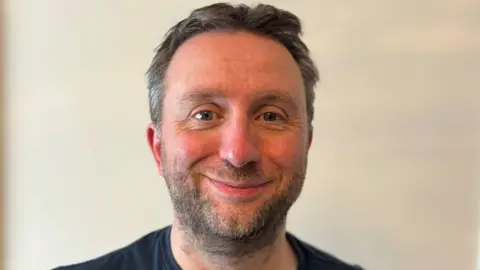'There's a life before tinnitus and a life after it'
 Dr James Jackson
Dr James JacksonFor Dr James Jackson there's no such thing as a quiet night's sleep. Instead his head is filled with the sounds of church bells, out of tune oboes and WW2 bombers.
Diagnosed with tinnitus as a child he is one of an estimated 7.6m people in the UK to have the condition. He spoke to the BBC about his experience as part of Tinnitus Awareness Week.
"They are just there all the time," the 51-year-old academic says of the "cacophony" of "random and spontaneous" noises floating around his head.
Having developed tinnitus aged six following a bout of measles, Dr Jackson says he thought the ever-present noises were just normal to begin with.
But when he suffered catastrophic hearing loss in both ears aged 19, resulting in severe deafness, the condition became problematic.
Initially, he says, he turned to drinking in a bid to drown out the noises, before he was able to find other coping mechanisms.
"I used to rely quite heavily on alcohol," he says.
"I saw [tinnitus] as an invader in my own head [and] it was much easier to drink heavily and hope I fall unconscious than it actually was to try to go to sleep."
'People lock themselves away'
Tinnitus is the name for hearing noises that do not come from an outside source. The sounds can come and go but for some they are there all the time.
It is not clear what causes tinnitus but it is often linked to hearing loss, conditions such as diabetes, thyroid disorders or multiple sclerosis and can be a result of anxiety or depression.
After completing a PhD in Psychology Dr Jackson now studies and researches the condition at Leeds Trinity University.
He says it can often be caused by damage to the ears such as head trauma, excessive stress, old age or industrial noise.
"Basically the damage to the ear means it sends random and spontaneous signals to the brain," he says.
"The brain doesn't know any better. The brain believes the ear and it thinks these sounds really exist.
"It's not hallucination or hearing voices, it's the brain going on the information that it's given and the problem is these noises are different for everybody.
"When you're under severe stress it's much more noticeable, but also when you're trying to wind down, relax, go to sleep, it's still there. It doesn't go away.
"People see a life before tinnitus and a life after it," he says.
'It doesn't have to be purely negative'
 James Skaife
James SkaifeJames Skaife, 30, from Sheffield has had tinnitus for as along as he can remember.
He says he first realised other people couldn't hear a ringing in their heads aged seven or eight.
"I talked to my parents about it and they said I had an ear infection when I was a baby. I can't remember the day it started but I can remember the day I noticed it.
"About five or six years later I started having an introspective crisis about how I was experiencing life differently and that was hard to wrap my head around."
He says the biggest challenge had been learning to cope with the condition mentally.
"It is trying to figure out how to live with it. But it came a lot from talking to people.
"When I was 17, I had a friend who was colour-blind. He dealt with it by realising the way he experienced the visual world was like no one else.
"It was so unique to him that it didn't matter if he was colour-blind or not because he was never going to see the world another way."
While he says he is lucky, because his tinnitus doesn't wake him up at night or cause him pain, as a music fan, he does have to be careful about headphone volume and seeing live music.
He says: "Aged 14, the doctor told me I was more likely to get hearing loss because if I wanted to listen to stuff the way other people do I would be tempted to turn the volume up and that would lead to hearing loss. And I've internalised that quite a lot. So, if anything, I listen to music too quietly."
Now he says his nightclubbing days are behind him - but he still experiences some problems seeing live music.
"Because I hear the ringing all the time I don't know when I've pushed it too far.
"It's better at festivals because it's a bit more open, but indoors is more intense. That's when you get the real ear ringing after you leave the building."
'You need emotional support'
The charity Tinnitus UK is calling for better training for healthcare professionals.
It says NHS patients face waits of up to three years for ENT appointments and more than 12 months for hearing aid assistance and psychological therapies - severely impacting patients' mental health and quality of life.
Tinnitus UK CEO Alex Brooks-Johnson says the charity is calling on the Department of Health and Social Care and the NHS to take a more consistent approach to training.
He says: "We think we have an answer, which is that GPs are not potentially the best people to speak to. 1 in 7 people have it. It's a hugely prevalent condition but for most people they live well.
"What we are hearing from people who have tinnitus is that first conversation people are having isn't good enough and they're being told there's no cure and nothing can be done and they have to manage it themselves.
"That can make it worse because there's a direct correlation between stress and tinnitus."
Dr Jackson agrees he wants to see specialists trained in counselling and bedside manner.
"Tinnitus shouldn't be treated as a symptom of hearing loss but as a condition itself.
"You need emotional support, empathy and understanding."
A Department of Health and Social Care spokesperson said community health services, such as audiology, had been neglected.
They said: "A crucial part of our 10 Year Health Plan will be moving towards a neighbourhood health service, enabling people to get diagnosed earlier and treated faster, closer to home, and we are committed to slashing waiting times from 18 months to 18 weeks."
Listen to highlights from West Yorkshire on BBC Sounds, catch up with the latest episode of Look North or tell us a story you think we should be covering here.
